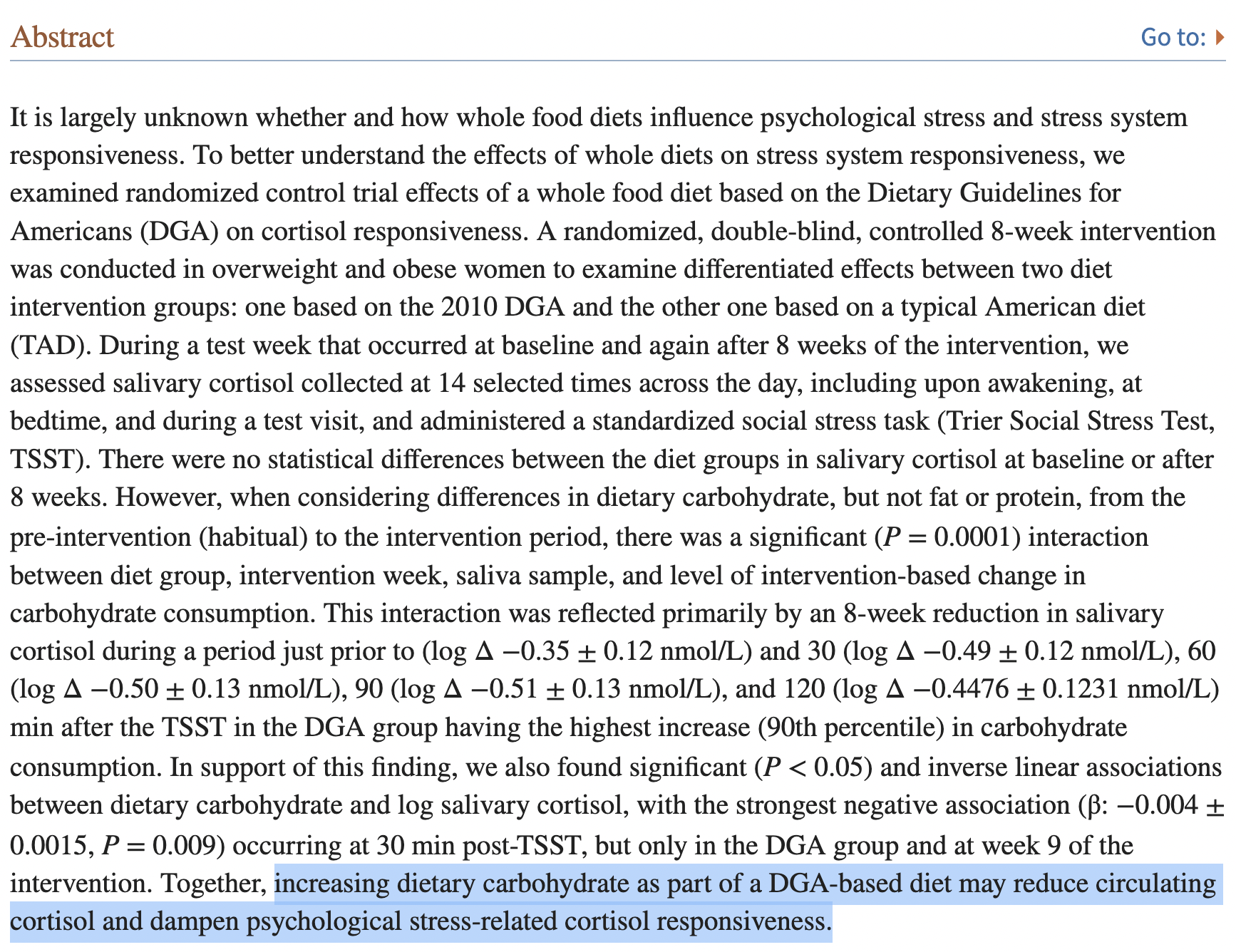Low Carb and Fasting are Stressing You Out!
Everyone agrees that elevated cortisol is catabolic and shortens lifespan. Some functional medicine practitioners understand how high cortisol destroys our protective, wellness hormones progesterone, testosterone and DHEA. But very few understand its most important and fundamental role, regulating blood sugar. In today’s article I’ll unpack how cortisol is wrecking metabolic health and what you can do about it.
TLDR:
1. Cortisol is the most potent aging hormone and we continue to make it until end of life
2. When the body becomes hypoglycemic, it releases the stress hormones adrenaline, noradrenaline, glucagon and cortisol to increase blood sugar
3. These stress hormones, especially cortisol, convert protein into glucose for fuel through a process called gluconeogenesis
4. Lack of dietary carbohydrates, excessive protein intake, fasting (including intermittent 16-8) and overall caloric restriction raise cortisol
5. Making sure you’re getting sufficient carbohydrates, enough calories, eating regularly and not over-exercising are crucial for managing cortisol and preventing insulin resistance
Cortisol is considered the most potent aging hormone, and its production continues throughout our lives. Unlike other youth-promoting steroid hormones that decline with age, cortisol levels increase contributing to various age-related health issues.
When blood sugar levels drop, the body initiates a stress response, releasing the hormones adrenaline, noradrenaline, glucagon, and cortisol to increase blood glucose. Cortisol's most significant impact on blood sugar regulation occurs through gluconeogenesis, a process that converts proteins into glucose. This mechanism ensures a steady supply of glucose for the brain and other vital organs, especially in the absence of dietary carbohydrates.
In other words, glucose is so important for your mitochondria to make energy and power the brain, liver, and other vital organs that your body will break down your own muscle tissue and convert it into glucose.
Several factors can trigger stress hormone release and disrupt metabolic health:
Low carb diets lead to increased cortisol production as the body struggles to maintain blood glucose levels. Long term, glucagon stays elevated mimicking insulin resistance
High protein consumption stimulates gluconeogenesis, increasing cortisol levels
Fasting, including popular 16:8 intermittent fasting protocols, elevates cortisol
Any chronic calorie deficit triggers a stress response leading to increased cortisol production
It’s well-known in the keto and carnivore communities that these diets, because of the lack of carbs, destroy sex hormones levels. This is called “pregnenolone steal” in the functional medicine community.
Chronic elevation of cortisol can lead to insulin resistance, a precursor to type 2 diabetes and other metabolic disorders. As discussed, cortisol promotes glucose production through gluconeogenesis in the liver but also inhibits insulin action in peripheral tissues, particularly skeletal muscle and adipose tissue. This dual action can result in consistently high blood sugar levels and reduced insulin sensitivity over time.
At the cellular level, cortisol interferes with insulin signaling by reducing the translocation of glucose transporter 4 (GLUT4) to the cell surface, thereby decreasing glucose uptake in muscle and fat cells. Chronic cortisol elevation promotes the accumulation of visceral fat, which is metabolically active and produces inflammatory cytokines. These cytokines further contribute to insulin resistance and metabolic dysfunction. Prolonged exposure to high cortisol levels can impair pancreatic β-cell function, reducing insulin secretion and exacerbating the progression towards type 2 diabetes.
It’s important to recognize that in many cases, physical stress has a higher physiological impact than psychological stress. Additionally, psychological stressors are much more easily handled when the body is not physically stressed.
I already listed the popular health-hacks that increase physical stress: low-carb diets which include keto and carnivore, fasting including intermittent, and caloric restriction. Another important physical stressor is over-exercise. Exercising too much will chronically elevate blood sugar via cortisol. Cortisol also lowers metabolic rate by inhibiting T3 conversion in the liver AND pituitary-thyroid signaling. Oppositely, eating carbohydrates will increase metabolic rate and decrease cortisol.
In the last week I had two consultations with cycling women who were back-to-back busy all day, eating high protein/low-carb diets, intermittent fasting, HIIT training 6 days/week and had serious cycle disruptions, low libido and fertility issues - all due to elevated cortisol from diet and lifestyle.
For a moderately active person, the body requires 150+ grams of carbohydrate (glucose) to power the brain, liver, muscles and others vital organs - more if you’re active. This is also necessary to prevent muscle loss.
To provide this much glucose you’re looking at about 55% of your total calories from dietary carbohydrates, 20% from protein and 25% from fat. The Katch-McArdle Calculator is a good way to determine your daily total caloric need.
You can either get carbs through natural sugars like fruit, fruit juice, maple syrup, honey or starches like rice, potatoes, and other roots and tubers.
If your metabolic rate has slowed (almost everyone) you’ll need to titrate your macros slowly. This means raising carbs about 15g/week while also lowering your fat/protein intake proportionately.
I found when making this change I wasn’t waking at 3am and my workouts had more stamina. In both cases it was restoring glycogen (stored glucose) in the liver to power the brain overnight and glycogen in the muscles to power the exercise.
Once last thing, the biggest proponents of low-carb diets through their best-selling books “The Bulletproof Diet” and “Fat for Fuel” Dave Asprey and Dr. Joseph Mercola respectively, have completely reversed their stance and are now eating high carb (450+ grams/day). So has Dr. Paul Saladino and fitness guru Thomas Delauer. One of the biggest influencers on fasting and high exercise volume, Dr. Peter Attia, has completely reversed his stance on these topics. All because of stress hormones.
If you’re interested in doing an audit of your stress profile and metabolic rate, just email me below and we’ll setup a consult.
To your health,
Jonathan




